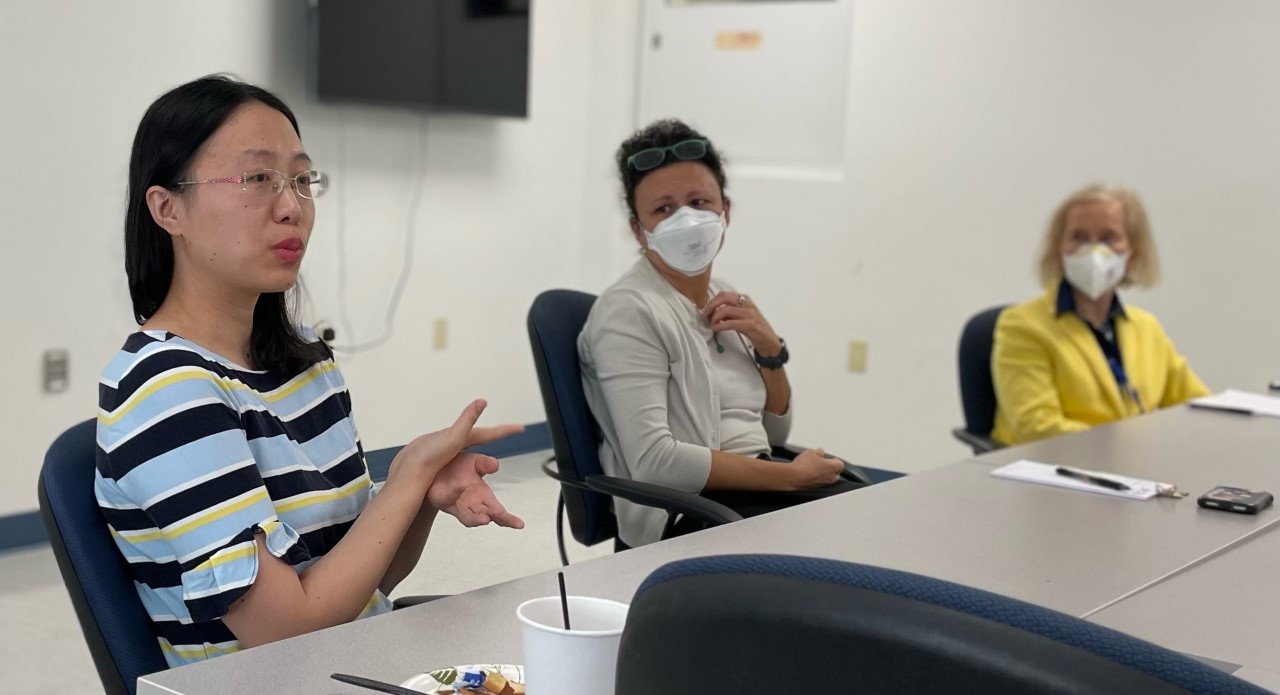In recognition of Women’s History Month and International Women’s Day, on March 10, 2023, the Department of Industrial and Systems Engineering (ISE) Inclusive Excellence Committee held a panel to discuss unique challenges and hurdles that women experience in academic careers. The panel included faculty scholars from various technical disciplines and different institutions. Attendees included faculty, staff and students from the Herbert Wertheim College of Engineering.
The panel was moderated by Michelle Alvarado, Ph.D., ISE assistant professor. The featured panelists were Anna Nagurney, Ph.D., the Eugene M. Isenberg Chair in Integrative Studies at the University of Massachusetts Amherst, Pinar Keskinocak, Ph.D., the William W. George Chair and Professor in the H. Milton Stewart School of Industrial and Systems Engineering at The Georgia Institute of Technology, Elif Akçali, Ph.D., ISE associate professor; and Xiaochen Xian, Ph.D., ISE assistant professor.
The panel addressed several topics related to inequalities in treatment and perception women face that may occur within the workplace, such as unconscious bias [1], decreased opportunities for promotions, or other merit-based recognition in the course of an academic career. Defined as formed opinions or stereotypes of people outside of conscious awareness, unconscious bias has impacted the careers of many women over the years and can occur in various forms.
Dr. Akçali offered the following, “The number of female faculty members is increasing. There is an increased recognition of the challenges faced by them. These are clear. However, there are still unconscious as well as systemic biases [1] toward female faculty that need to be addressed until there is no longer a need to give different types of advice to male and female faculty members.”
One form of unconscious bias can be how female faculty members tend to receive lower instructor evaluations compared to their male counterparts [2]. In addressing the topic of teaching and teaching evaluations, the panel commented on how women faculty may more frequently receive destructive criticisms and/or criticisms with non-academic themes (e.g., appearance, clothing, managing work-life balance). It was also noted how critically important it is for tenure and promotion committees as well as academic unit, college, and university administrators to be aware of this type of bias, and that it may need to be taken into account in merit-based, promotion, and tenure decisions.
During the panel, each woman shared their personal experiences in academia, focusing on barriers they may have faced as a woman along with moments in which they were encouraged. The panel was asked to comment on prominent women mentors they have had over the years and it was noted that support has been provided not only from women but also from men.
Katie Basinger-Ellis, Ph.D., ISE instructional assistant professor, said that when it comes to mentoring, “It’s just as important for men to give time and space for women as it is for women to give time and space for women.” Additionally other panelists noted that one can have multiple mentors at the same time, and that the pool of mentors can change over time as the individual progresses throughout their career.
The panel addressed challenges of work-life balance and how this proposition is often more difficult for women to address than men, as a result of family commitments. It was observed that the association of a “woman’s worth” with child-bearing is an antiquated notion and having children is a personal choice. For those women who desire to have children, there are unique challenges they may face during the course of an academic career. Due to the multi-dimensional workload of faculty positions (research, teaching, service, etc.), there is a need for women faculty, in particular, to have flexibility for balance of work and personal life. A number of attendees also shared examples of positive experiences in balancing life with work.
Many of the attendees considered this event to serve as a mentoring opportunity for students, staff, and faculty alike. One of the panelists commented that mentoring can take many forms and often occurs in “one-off conversations and gatherings,” like the panel. Karen Hicklin, Ph.D., ISE assistant professor, said, “It was nice to be in the room with women who have accomplished so much in their careers. I appreciated the opportunity to engage with mentors that I may not otherwise have the opportunity to engage with.”
This panel provided an opportunity for a diverse group of faculty, students, and staff to hear the voices of successful women in academia. Although women remain an identified minority in the field of engineering, David Kaber, Ph.D., Dean’s Leadership Professor and ISE department chair said, “At UF, the representation of female faculty has been growing in many disciplines, including ISE. The increase in highly talented female engineering faculty in our college is important to encouraging more female students to pursue engineering degrees and to ultimately take positions in academia and industry, as well as lead our discipline.”
References:
[1] Banaji RR, Greenwald AG. 2016. Blindspot: Hidden Biases of Good People. Random House Publishing Group.
[2] Aragón OR, Pietri ES, Powell BA. Gender bias in teaching evaluations: the causal role of department gender composition. Proceedings of the National Academy of Sciences of the United States of America. 120: e2118466120. PMID 36649402 DOI: 10.1073/pnas.2118466120
